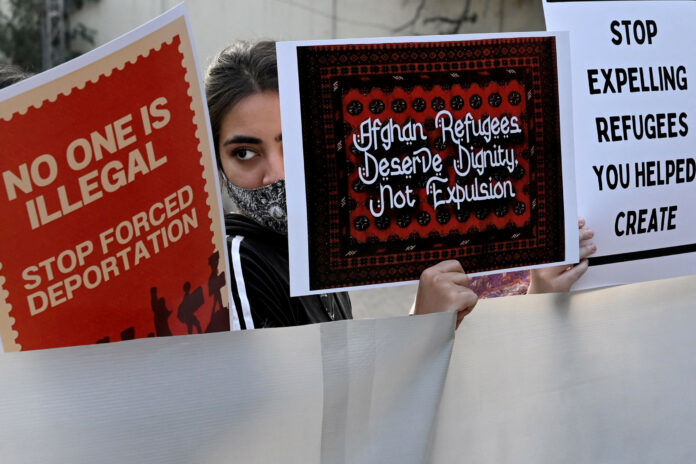Zahab* wakes up and brews her three children some tea. They crowd around on the floor in the one room apartment she rents in Islamabad, Pakistan. The day is beginning but they have nowhere to go. They dare not leave the apartment at all because they fear they will be arrested and deported. Afghans in Pakistan like Zahab fled their country in terror amid Taliban threats following their 2021 takeover. Now, they live in fear of not only the police, but of everyone in Pakistan.
This fear of the Pakistani authorities, and other Pakistanis willing to report undocumented Afghans, has reached a critical high. In early October, the Interim Interior Minister of Pakistan Sarfraz Bugti announced that all Afghan nationals “in the country illegally” should leave before Nov. 1, or else be expelled from the country. Yet the Pakistani government has also refused to register virtually all Afghans who have sought safety in the country for the last 15 years, meaning that this reckless order is affecting nearly 2 million people.
Over the last several months Pakistani authorities have arrested, detained, and deported Afghans and in the space of just a few weeks they established a network of at least 49 “holding centers” throughout the country. While international organizations and donor countries have criticized this decision, the Pakistani government has doubled down.
From mid-September through the first week of December, almost half a million Afghans have been compelled to leave Pakistan and return to Afghanistan. Of those, at least 27,000 have been forcefully deported. NGOs and U.N. agencies at the borders are receiving the returnees, but have little ability to assist them or track their protection needs once they enter Afghanistan.
The ramifications of this large-scale deportation campaign are disastrous for Afghans like Zahab and her children. If discovered, Pakistan will forcibly return them to a country facing both a humanitarian crisis and a human rights catastrophe.
Afghanistan remains the largest humanitarian crisis in the world with more than 29 million people––over half the population––in need of humanitarian assistance. People don’t have food or clean water, and diseases like cholera are spreading. Deporting Afghan refugees in the middle of winter is only throwing fuel on the emergency.
Pakistan is also forcing Afghan refugees back into the maw of the Taliban’s assault on human rights. Many deportees will face persecution at best, death at worst. This is especially true for Afghans who worked in high-level positions within the former Afghan government, or were in the Afghan military, worked as human rights advocates, or worked as journalists.
Pakistan is deporting Afghan women and girls into a gender apartheid state. The Taliban have issued more than 80 edicts denying rights to women and girls, such as the prohibition on girls going to school after the sixth grade. Women and girls are banned from parks and gyms and prohibited from working for NGOs or the U.N. They cannot own most businesses. The Taliban is systematically erasing women from public life.
ARIF ALI/AFP via Getty Images
Pakistan explained their decision by citing security concerns after the Tehrik-e Taliban Pakistan (TTP) carried out several terrorist attacks in Pakistan in recent months. But it is unlikely Pakistan will be made safer by expelling the very Afghans who dedicated decades of their lives to pushing back against the Taliban and promoting human rights and democracy in Afghanistan.
It is essential that the Pakistani government reverses its decision. The country has a long history of hosting Afghans. Now is certainly not the time to stop. International actors including the United States and U.N. Refugee Agency (UNHCR) must use every diplomatic tool and immigration pathway at their disposal to preserve the rights—and lives—of Afghans seeking safety. UNHCR needs to fulfill its mandate and be stronger in opposing mass refoulement, while pushing to register Afghan nationals. The United States, Canada, and the European Union should expedite resettlement programs that have languished over the past two years with renewed urgency. And donors must step up to help Pakistan share the responsibility of hosting millions of their Afghan neighbors.
As Zahab pours her freshly brewed tea, she fears that this will be the day she and her children are deported. She was a parliamentarian in Afghanistan before the Taliban took over her country. Looking from her expired visa to her phone filled with threatening text messages, she wonders, what next? At this point, Pakistan is her only hope to survive.
*The authors used a pseudonym to protect the identity of their source amid security threats.
Devon Cone is the senior advocate for women and girls at Refugees International.
Sabiha Khan is the senior external relations officer at Refugees International.
They traveled to Pakistan earlier this year to examine the situation of Afghan women refugees there and authored the report, ‘They Left Us Without Any Support’: Afghans in Pakistan Waiting for Solutions.
The views expressed in this article are the writers’ own.
Uncommon Knowledge
Newsweek is committed to challenging conventional wisdom and finding connections in the search for common ground.
Newsweek is committed to challenging conventional wisdom and finding connections in the search for common ground.


